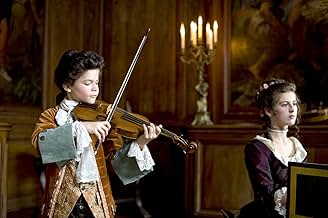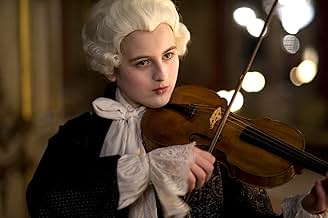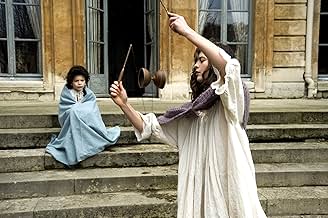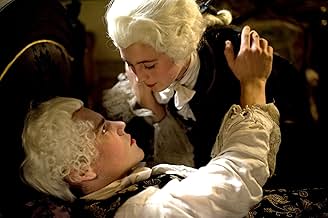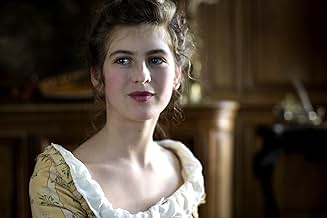IMDb रेटिंग
6.4/10
1.6 हज़ार
आपकी रेटिंग
अपनी भाषा में प्लॉट जोड़ेंA reimagined account of the early life of Maria Anna 'Nannerl' Mozart, five years older than Wolfgang, and a musical prodigy in her own right.A reimagined account of the early life of Maria Anna 'Nannerl' Mozart, five years older than Wolfgang, and a musical prodigy in her own right.A reimagined account of the early life of Maria Anna 'Nannerl' Mozart, five years older than Wolfgang, and a musical prodigy in her own right.
- पुरस्कार
- 2 जीत और कुल 8 नामांकन
फ़ीचर्ड समीक्षाएं
Léopold Mozart promotes his musical children; Wolfgang and his elder 14 year old daughter Maria Anna 'Nannerl' Mozart (Marie Féret) to the royalties throughout Europe. He tries to restrict Nannerl's musical ambitions in the patriarchal society. She believes she may have contributed to Wolfgang's writing but Léopold dismisses her and forbids her from continuing to write. She befriends the daughters of the King especially Louise. She delivers a letter to Louise's brother Le Dauphin in mourning but she has to be disguised as a man to avoid a scandal. He encourages her to write. She meets him several times but only in disguised. He is conflicted about making her his mistress unwilling to repeat his father's debauchery.
This is an intriguing fictional biography. Marie Féret is the director's daughter and mostly fails to energize this costume period piece. The movie is two hours long and requires her to carry it on her shoulders. This has loads of potential for scandal and passion but none of it comes to pass. This does have a quiet beauty but is mostly a squandered opportunity.
This is an intriguing fictional biography. Marie Féret is the director's daughter and mostly fails to energize this costume period piece. The movie is two hours long and requires her to carry it on her shoulders. This has loads of potential for scandal and passion but none of it comes to pass. This does have a quiet beauty but is mostly a squandered opportunity.
It's difficult for me to see a film like this as a professional musician without seeing red at the same time. No, I'm not expecting a slavish rehash of history - far from it -but it wandered so far from reality as to remind me of films such as "Song to Remember" with Cornel Wilde swinging through the grapevines and playing the frail, tubercular Chopin at the same time.
Leopold Mozart, despite the general feeling that he pushed his children unmercifully, was actually trying to help his children become established in the world and to prevent his son from squandering his money as he was always tempted to do. In fact poor Wolfgang was buried in a pauper's grave after his father died.
The music in the film is another bone of contention. Instead of using something from the immense amount of music Wolfgang composed as background, it substituted a fake Classical imitation with romantic harmonies and orchestration that really wasn't good to begin with.
As for the ultra-low lighting we associate with "le film noir' or crime shows currently on television, we had to depend too often on dialog alone to guide us through what was happening. I realize that filming interiors with candles was period but even people sitting next to them were mainly in the dark. I know this is handy for not having to provide full period sets in detail but still I felt cheated.
This is a French work, nonetheless, and as so many French films are prone to do, it talks itself to death.
Curtis Stotlar
Leopold Mozart, despite the general feeling that he pushed his children unmercifully, was actually trying to help his children become established in the world and to prevent his son from squandering his money as he was always tempted to do. In fact poor Wolfgang was buried in a pauper's grave after his father died.
The music in the film is another bone of contention. Instead of using something from the immense amount of music Wolfgang composed as background, it substituted a fake Classical imitation with romantic harmonies and orchestration that really wasn't good to begin with.
As for the ultra-low lighting we associate with "le film noir' or crime shows currently on television, we had to depend too often on dialog alone to guide us through what was happening. I realize that filming interiors with candles was period but even people sitting next to them were mainly in the dark. I know this is handy for not having to provide full period sets in detail but still I felt cheated.
This is a French work, nonetheless, and as so many French films are prone to do, it talks itself to death.
Curtis Stotlar
It seems very tempting, Mozart's Sister – the opportunity of another 18th century costume picture, this one from France – produced, written and directed by René Féret. For those who enjoy historical fiction, the film poses as yet one more chance to unlock the doors and peer into the family closets of composer Wolfgang Amadeus Mozart. After all, it's been twenty-seven years since the spectacular emergence of director Milos Forman's Amadeus, which gathered eight Oscars, including Best Picture – as well as for the author of its screenplay, Peter Shaffer, adapting and shaping his multi-Tony Award-winning theatrical masterpiece into iconic cinematic genius. Since the 1984 premiere of Amadeus, business continues to boom in the Mozart industry; a chance at playing either of the Leading Roles of the so-called "rivals" – Mozart and (the nearly forgotten and second-rate) composer Antonio Salieri – continue to inflame the ambitions of many a stage actor; and a recent release of the film into Blu-Ray format proves that Amadeus is here to stay and guaranteed a re-incarnation into whatever format is on the horizon. Mozart's Sister is destined for landfill.
Amadeus and Mozart's Sister are both of the "re-imagined" variety. In other words, for its authors, Truth is but an adjunct to Creative License. Re-imagining the adventures of the Mozart family begins somewhere in a flurry of sheet music, ribbon-bound letters, yellowing diaries, and stories heard around any Music Conservatory. Somewhere in this reverie, René Féret and Peter Shaffer both employ the same controlling gimmick — "I coulda been somebody!" For Shaffer, Salieri knows his musical gifts are lacking, but the Viennese Court doesn't know it until Mozart suddenly shows up. According to Féret, Mozart's sister Nannerl believes that – had she been born as Wolfgang's brother – they might have become the first European Dynamic Duo. No need for Certitude here. "Re-imagined" needs just a few facts and figures, but the finished product requires the entertainment value of Barnum & Bailey. Mozart's Sister wouldn't qualify for a side show.
René Féret's shooting script of Mozart's Sister cannot avoid comparison to Amadeus. Peter Shaffer nurtured his idea through the disciplines of live Theatre. The structure and rhythm of his re-imagined Amadeus is developed through much rehearsal and three continuous years on Broadway before he re-vamps the script for Hollywood. By contrast, Féret's end product is a plodding, witless and gloomy bore. His treatment of the premise that Nannerl Mozart is a suppressed and thwarted genius composer with Box Office appeal similar to that of her brother's – is limp and void of artistic climax. Likewise, there's no satisfaction to be had in the tedious and anemic performances rendered by Féret's daughters – Marie as "Nannerl" and Lisa as "Louise of France".
Salieri, on the other hand, would applaud Mozart's Sister for its inherent mediocrity.
Amadeus and Mozart's Sister are both of the "re-imagined" variety. In other words, for its authors, Truth is but an adjunct to Creative License. Re-imagining the adventures of the Mozart family begins somewhere in a flurry of sheet music, ribbon-bound letters, yellowing diaries, and stories heard around any Music Conservatory. Somewhere in this reverie, René Féret and Peter Shaffer both employ the same controlling gimmick — "I coulda been somebody!" For Shaffer, Salieri knows his musical gifts are lacking, but the Viennese Court doesn't know it until Mozart suddenly shows up. According to Féret, Mozart's sister Nannerl believes that – had she been born as Wolfgang's brother – they might have become the first European Dynamic Duo. No need for Certitude here. "Re-imagined" needs just a few facts and figures, but the finished product requires the entertainment value of Barnum & Bailey. Mozart's Sister wouldn't qualify for a side show.
René Féret's shooting script of Mozart's Sister cannot avoid comparison to Amadeus. Peter Shaffer nurtured his idea through the disciplines of live Theatre. The structure and rhythm of his re-imagined Amadeus is developed through much rehearsal and three continuous years on Broadway before he re-vamps the script for Hollywood. By contrast, Féret's end product is a plodding, witless and gloomy bore. His treatment of the premise that Nannerl Mozart is a suppressed and thwarted genius composer with Box Office appeal similar to that of her brother's – is limp and void of artistic climax. Likewise, there's no satisfaction to be had in the tedious and anemic performances rendered by Féret's daughters – Marie as "Nannerl" and Lisa as "Louise of France".
Salieri, on the other hand, would applaud Mozart's Sister for its inherent mediocrity.
Stop me if you've heard this one before: Mozart, that legendary impresario, had an sibling who actually helped write a lot of his early work, and got precisely no credit for it... due to the sexist society at the time. She was also a brilliant violinist, but was forced to play the harpsichord by her father as the violin 'was no instrument for a lady.' Meanwhile, everyone mooned over her brother, the 'child prodigy', leaving her completely in the shade. In fact, a lot of what she could have achieved she didn't thanks to the patriarchal beliefs back in the 18th century, and by the sound of the epilogue she had a pretty miserable life after she gave up on all her hopes and dreams. Nice.
How much of this has a basis in reality I don't know, but I suspect there's a fair bit of airbrushing of history here. What can't be denied though, is this is a well acted drama of family ties and unfulfilled potential, full of wonderful classical music and handsome costumes. This is strictly a placid affair... You're not going to see any fireworks going off, and some people may find it all a bit too stagy. But Nannerl is a captivating lead, and while her story might not be 100% accurate as depicted here, it's well worth investing the nearly two hours to discover it. And isn't that really what matters, at the end of the day? 6/10
How much of this has a basis in reality I don't know, but I suspect there's a fair bit of airbrushing of history here. What can't be denied though, is this is a well acted drama of family ties and unfulfilled potential, full of wonderful classical music and handsome costumes. This is strictly a placid affair... You're not going to see any fireworks going off, and some people may find it all a bit too stagy. But Nannerl is a captivating lead, and while her story might not be 100% accurate as depicted here, it's well worth investing the nearly two hours to discover it. And isn't that really what matters, at the end of the day? 6/10
Wolfgang Mozart's older sister was exceptionally talented. And, as she grew, her family discouraged her and put all their energy into her brother and pushed her to marry and have a family. All this is shown in the film and cannot really be refuted. However, the filmmaker's have decided to take some liberties--to ASSUME certain things about Maria Mozart that we simply do not know to be true today. In that sense, it's quite a bit like "Amadeus"--fictionalizing history a bit here and there. The story has a strong feminist bent--and even goes so far as to attribute much of Wolfgang's talent to her! This is rather dubious, as Wolfgang clearly was insanely gifted. It's an intriguing idea--but there really isn't any basis for this assertion. Now this complete fiction COULD have worked--but the rest of the story is incredibly dull--very, very mannered, slow and lacking anything to hook the viewer. 'What if' just isn't enough to carry the rest of the film and I felt EXTREMELY restless as the film progresses. My butt also fell asleep--and it's a great judge of whether or not a film is too tedious!
क्या आपको पता है
- गूफ़Near the opening of the film, Nannerl tells Louise that she is 14, almost fifteen. This place the action in the winter of 1765-66. While the character Louise says she is 13, the real Louise would have been 28 years old. In fact, the princess return to court from the Abbey of Fontevraud in 1750, the year before Nannerl's birth.
टॉप पसंद
रेटिंग देने के लिए साइन-इन करें और वैयक्तिकृत सुझावों के लिए वॉचलिस्ट करें
- How long is Mozart's Sister?Alexa द्वारा संचालित
विवरण
- रिलीज़ की तारीख़
- कंट्री ऑफ़ ओरिजिन
- आधिकारिक साइटें
- भाषा
- इस रूप में भी जाना जाता है
- Mozart's Sister
- फ़िल्माने की जगहें
- उत्पादन कंपनियां
- IMDbPro पर और कंपनी क्रेडिट देखें
बॉक्स ऑफ़िस
- बजट
- $45,00,000(अनुमानित)
- US और कनाडा में सकल
- $7,07,885
- US और कनाडा में पहले सप्ताह में कुल कमाई
- $34,046
- 21 अग॰ 2011
- दुनिया भर में सकल
- $13,80,379
इस पेज में योगदान दें
किसी बदलाव का सुझाव दें या अनुपलब्ध कॉन्टेंट जोड़ें


